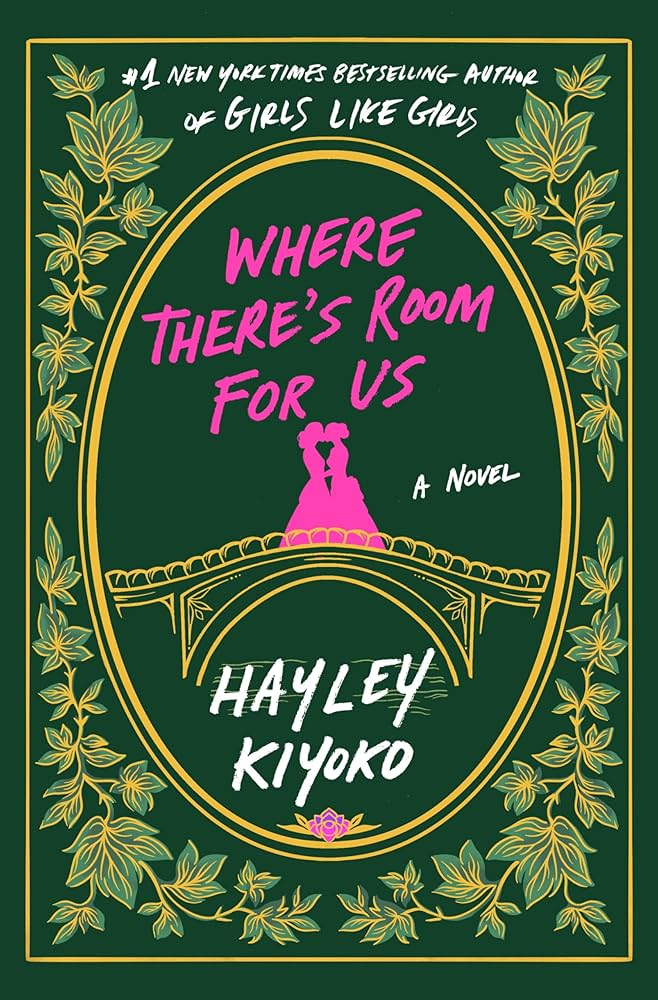In a reimagined 1880s England where same-sex love is accepted yet the patriarchy still rules, Hayley Kiyoko delivers a tender romance between two young women navigating the tension between selfhood and social expectation. Where There’s Room for Us follows Ivy, an outspoken poet from New York who relocates to England, and Freya, a dutiful socialite who’s expected to marry a lord and produce heirs in order to secure her family’s legacy. What begins as curiosity quickly deepens into a slow-burn sapphic romance filled with charm, social commentary, and a quiet but persistent sense of rebellion as Ivy and Freya begin to imagine a life that might finally be their own—if they can bear the cost of claiming it.

It’s not every day a whole prime minister accuses you of being a harbinger of sapphic doom.
Hayley Kiyoko, Where There’s Room for Us
Ivy and Freya feel like two different versions of girlhood crashing into each other at the exact right moment. Ivy already knows who she is. She’s flirtatious, outspoken, comfortable sinking into her love for women without apology. She walks into a room and you can practically feel all the air shift her way. Freya, by contrast, has spent her life doing what she is told and calling it love. She reveres her father and plans to marry Lord Montgomery because that is the path laid out for her. But when she meets Ivy, she has to name what she wants for the first time in her life, and that awakening is honestly so satisfying.
Freya’s mostly peripheral relationship with her father is also more layered than I expected. She loves him and wants his approval, but eventually begins to see that his approval comes with a cost she can no longer keep paying. He is obsessed with securing an heir who can inherit his title, and because he only has daughters, he pushes Freya toward a marriage she does not want. There is one particular moment when he discovers how Freya feels about Ivy, and his reaction is ugly. Freya runs, and for one fleeting instant, she imagines what might have happened if her sister hadn’t found her and taken her in, how easily she could have been left with nowhere to go. That brief beat in the story brushes against something painfully real for many queer readers: the fear of losing home, safety, and family simply for being honest about who they are. Kiyoko weaves moments like this throughout the story, grounding the romance in quiet echoes of real-world anxieties and creating an emotional connection that feels both tender and true.
What a thing, to just be accepted like she belongs.
Hayley Kiyoko, Where There’s Room for Us
By removing homophobia from this fictional world yet leaving sexism intact, Kiyoko forces readers to see how privilege and oppression can coexist within the same structures. It reframes Victorian England through a speculative lens that feels both fresh and hauntingly recognizable. Marriage equality exists, but equality itself does not. A woman may love another woman, but she cannot inherit her father’s title or estate because that privilege is only afforded to men. This results in an intriguing tension between freedom and frustration, where Ivy and Freya’s hearts are liberated but their fates are not. It’s a subtle but biting commentary on how reform without equality still reinforces old hierarchies.
The romance is where the book falters slightly. Ivy and Freya are undeniably sweet, sometimes so sugary it almost made my teeth ache. Their early scenes together are tender and full of kissing in gardens, along forest paths, against trees—everywhere—and while that has its charm, I kept wishing for a little more tension beneath all that softness. Time jumps also rush past key emotional turns. Conflicts flare, confessions are made, family drama erupts, and then suddenly it’s two weeks later and everything has quietly resolved itself. I wanted to linger in those rough edges and actually see Ivy and Freya fight for what they keep saying is worth everything.
The novel’s closed-door romance approach adds to that sense of restraint. It’s likely a deliberate choice to make the story accessible to younger readers, and that’s understandable, but it leaves a noticeable gap between what’s shown and what’s implied.
If security comes at the cost of your soul, then it is not a choice you can make freely.
Hayley Kiyoko, Where There’s Room for Us
For all its emotional depth, the story’s conclusion feels too tidy and rushed. Some conflicts wrap up too neatly, and some emotional threads, especially between Freya and her father, never really get revisited. I kept waiting for the book to force her father to face his hypocrisy, but instead, he is mostly allowed to stay himself. On one hand, that is realistic. A lot of queer readers know exactly what it’s like to love a parent who will never meet you in the middle. On the other hand, I wish the story spelled out what that means for Freya long term. Sometimes I want to see plots like that buttoned up in fiction since real life isn’t required to make sense or be fair. Alas!
Still, this book reads like a love letter to queer readers. Ivy and Freya are adorable together, but it’s the context around their romance—the inheritance laws, the rigid gender roles, the quiet heartbreak of disappointing a beloved parent simply for being who you are—that really resonates. Kiyoko’s world doesn’t fix everything, but it gives us space to imagine better. And for that alone, it’s worth a read.
Thank you to NetGalley and Wednesday Books for sharing an advanced reader copy of this book in exchange for an honest review.
